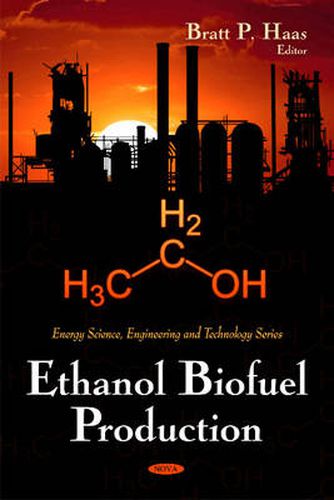Readings Newsletter
Become a Readings Member to make your shopping experience even easier.
Sign in or sign up for free!
You’re not far away from qualifying for FREE standard shipping within Australia
You’ve qualified for FREE standard shipping within Australia
The cart is loading…






Fuel ethanol production has increased steadily in the U.S. since the 1980’s, when it was given impetus by the need to reduce energy dependence on foreign supplies. The momentum has continued as production costs have fallen, and as the U.S. Clean Air Act has specified a percentage of renewable fuels to be mixed with gasoline. New technologies that may further increase cost savings include co-product development, such as recovery of high-value food supplements, and cellulosic conversion. Though improvements in processing and technology are important, however, the fluctuating rise of inputs such as corn, the cost of energy alternatives, and environmental developments play larger roles in the fortunes of the industry. This book examines the use of ethanol as fuel, as well as its other applications in different parts of the world. This book also addresses a policy initiative by the Federal Administration to apply United States Department of Energy (DOE) research to broadening the country’s domestic production of economic, flexible, and secure sources of energy fuels. This book consists of public documents which have been located, gathered, combined, reformatted, and enhanced with a subject index, selectively edited and bound to provide easy access.
$9.00 standard shipping within Australia
FREE standard shipping within Australia for orders over $100.00
Express & International shipping calculated at checkout
Fuel ethanol production has increased steadily in the U.S. since the 1980’s, when it was given impetus by the need to reduce energy dependence on foreign supplies. The momentum has continued as production costs have fallen, and as the U.S. Clean Air Act has specified a percentage of renewable fuels to be mixed with gasoline. New technologies that may further increase cost savings include co-product development, such as recovery of high-value food supplements, and cellulosic conversion. Though improvements in processing and technology are important, however, the fluctuating rise of inputs such as corn, the cost of energy alternatives, and environmental developments play larger roles in the fortunes of the industry. This book examines the use of ethanol as fuel, as well as its other applications in different parts of the world. This book also addresses a policy initiative by the Federal Administration to apply United States Department of Energy (DOE) research to broadening the country’s domestic production of economic, flexible, and secure sources of energy fuels. This book consists of public documents which have been located, gathered, combined, reformatted, and enhanced with a subject index, selectively edited and bound to provide easy access.